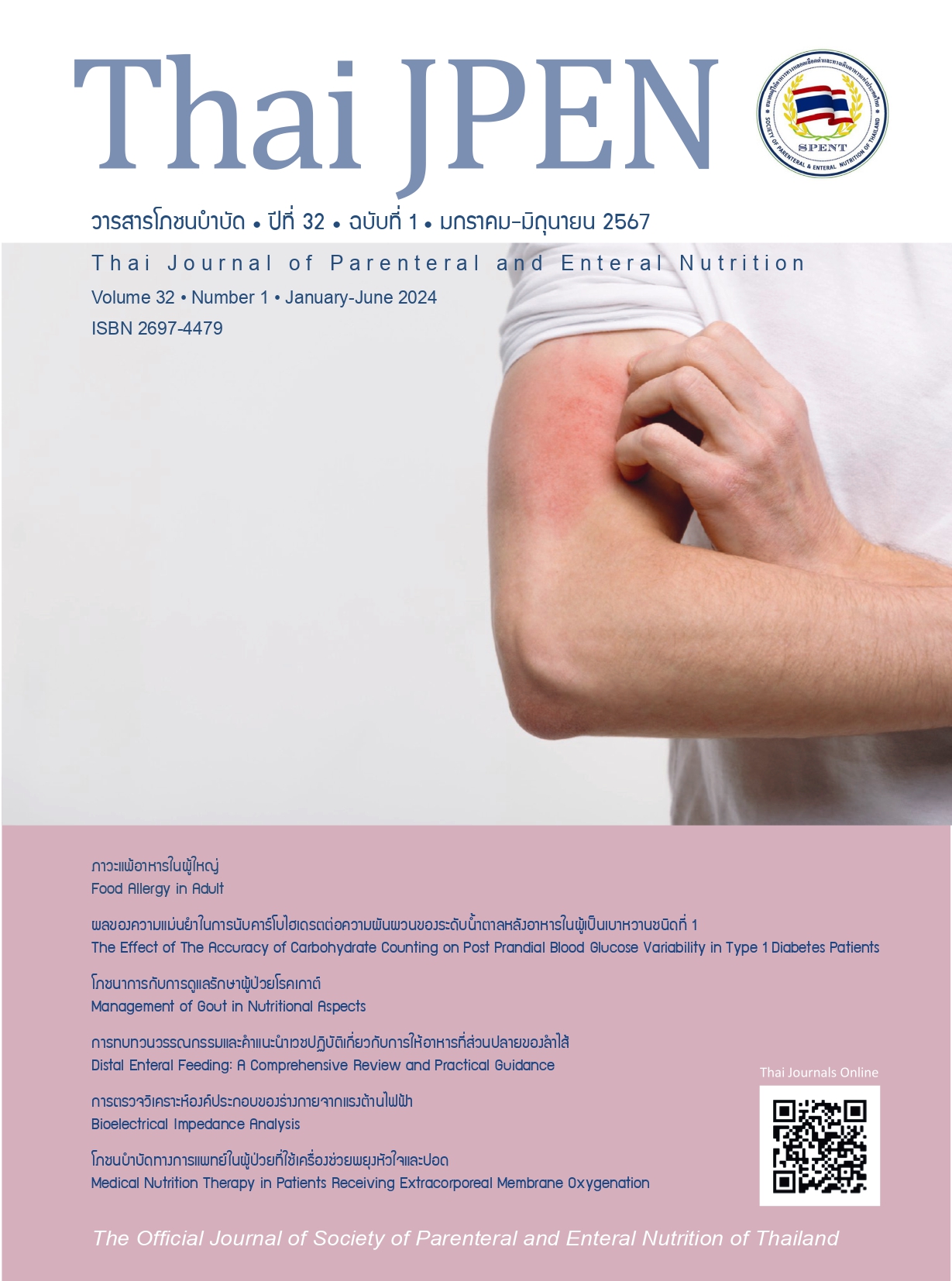ผลของความแม่นยำในการนับคาร์โบไฮเดรตต่อความผันผวนของระดับน้ำตาลหลังอาหาร ในผู้เป็นเบาหวานชนิดที่ 1
คำสำคัญ:
การนับคาร์โบไฮเดรต, เบาหวานชนิดที่ 1, ระดับน้ำตาลในเลือดหลังอาหาร 2 ชั่วโมงบทคัดย่อ
การนับคาร์โบไฮเดรต (นับคาร์บ) เป็นวิธีการหนึ่งที่ใช้เพื่อการคำนวณปริมาณอินซูลินที่ฉีดในมื้ออาหารให้กับผู้เป็นเบาหวานชนิดที่ 1 เพื่อควบคุมระดับน้ำตาลหลังอาหารให้อยู่ในเกณฑ์เป้าหมาย ดังนั้น ความแม่นยำในการนับคาร์บจึงเป็นสิ่งจำเป็น การศึกษานี้มีวัตถุประสงค์เพื่อศึกษาความสัมพันธ์ของความแม่นยำในการนับคาร์โบไฮเดรตกับระดับน้ำตาลในเลือดหลังอาหาร 2 ชั่วโมง ในผู้เป็นเบาหวานชนิดที่ 1 ที่ผ่านการอบรมการนับคาร์บ มี insulin-to-carbohydrate ratio และ insulin sensitivity factor เป็นการศึกษาแบบ Prospective observational study ผู้เป็นเบาหวานบันทึกอาหารที่รับประทาน นับคาร์บ และตรวจน้ำตาลปลายนิ้วก่อนและหลังอาหาร 2 ชั่วโมงในแต่ละมื้อเป็นเวลา 4 วัน และส่งภาพถ่ายอาหาร ผลการนับคาร์บให้นักกำหนดอาหารเพื่อตรวจนับและพิจารณาความแม่นยำ โดยเปรียบเทียบกับค่าเฉลี่ยการนับคาร์บของนักกำหนดอาหาร 2 คน
ผลการศึกษา: กลุ่มตัวอย่างทั้งหมด 30 คน โดยร้อยละ 85 ของมื้ออาหารทั้งหมด (294/345) กลุ่มตัวอย่างนับคาร์บได้แม่นยำ มีค่าเฉลี่ยผลต่างรวมของการนับคาร์บระหว่างผู้เป็นเบาหวานกับนักกำหนดอาหารคือ 8.2 ± 6.3 กรัม (0.5 คาร์บ) ค่าสัมบูรณ์ความแตกต่างระดับน้ำตาลก่อนและหลังอาหารเฉลี่ยรวมทุกมื้อของกลุ่มตัวอย่างอยู่ที่ 28.8 ± 22.4 มิลลิกรัม/เดซิลิตร พบว่า มีแนวโน้มความสัมพันธ์ที่ระดับน้ำตาลหลังอาหาร 2 ชั่วโมงแตกต่างกับระดับน้ำตาลก่อนอาหารมาก เมื่อมีความแตกต่างระหว่างการนับคาร์บของผู้เป็นเบาหวานกับนักกำหนดอาหารมาก (Spearman’s rho = 0.300, P = 0.107) แต่ยังไม่มีนัยสำคัญทางสถิติ อย่างไรก็ตามในมื้อเย็นพบว่าเมื่อมีผลต่างการนับคาร์บระหว่างผู้เป็นเบาหวานกับนักกำหนดอาหารที่มากขึ้น จะสัมพันธ์กับระดับน้ำตาลหลังอาหารมื้อเย็นที่มากขึ้นอย่างมีนัยสำคัญทางสถิติ (Spearman’s rho = 0.293, P = 0.002)
สรุป: ผู้เป็นเบาหวานที่ผ่านการอบรมการนับคาร์บสามารถนับคาร์บได้แม่นยำ ระดับน้ำตาลหลังอาหารที่เพิ่มขึ้นอยู่ในเกณฑ์น่าพอใจ และมีแนวโน้มความสัมพันธ์ระหว่างความแม่นยำในการนับคาร์บกับความแตกต่างของระดับน้ำตาลก่อนและหลังอาหารแต่ไม่มีนัยสำคัญทางสถิติ ผลการศึกษานี้สนับสนุนประโยชน์ของการนับคาร์โบไฮเดรตในผู้เป็นเบาหวานชนิดที่ 1
เอกสารอ้างอิง
Diabetes Control and Complications Trial (DCCT): Results of feasibility study. The DCCT Research Group. Diabetes Care 1987;10(1):1–19.
American Diabetes Asscociation. 14. Children and adolescents: standards of medical care in diabetes—2022. Diabetes Care 2022;45 Suppl 1:S208-15.
DAFNE Study Group. Training in flexible, intensive insulin management to enable dietary freedom in people with type 1 diabetes: dose adjustment for normal eating (DAFNE) randomised controlled trial. BMJ 2002;325(7367):746.
Bell KJ, Barclay AW, Petocz P, Colagiuri S, Brand-Miller JC. Efficacy of carbohydrate counting in type 1 diabetes:a systematic review and meta-analysis. Lancet Diabetes Endocrinol 2014;2(2):133-40.
Chaiyakot J, Somwang S, Hathaidechadusadee A, Areevut C, Saetung S, Saibuathong N, et al. Effects of carbohydrate counting on glycemic control in type 1 Diabetes patients: clinical experience in Thailand. J Med Assoc Thai 2017;100(8):856-63.
Ranasinghe P, Senadeera VR, Senarathna R, Sapurnika U, Ramanayake V, Jayawardena R. The association between the parents’ knowledge of carbohydrate counting and the glycaemic control of the children with type 1 diabetes. Int J Pediatr 2018;2018:1-7.
Brazeau A, Mircescu H, Desjardins K, Leroux C, Strychar I, Ekoé J, et al. Carbohydrate counting accuracy and blood glucose variability in adults with type 1 diabetes. Diabetes Res. Clin. Pract 2013;99(1):19-23.
Smart CE, Annan F, Higgins LA, Jelleryd E, Lopez M, Acerini CL. ISPAD Clinical Practice Consensus Guidelines 2018: Nutritional management in children and adolescents with diabetes. Pediatr Diabetes 2018;19(Suppl 27):136-54.
American Diabetes Association. 6. Glycemic targets: standards of medical care in Diabetes-2021. Diabetes Care 2021;44(Suppl1):S73-84.
Deeb A, Al Hajeri A, Alhmoudi I, Nagelkerke N. Accurate carbohydrate counting is an important determinant of postprandial glycemia in children and adolescents with type 1 Diabetes on insulin pump therapy. J Diabetes Sci Technol 2017;11(4):753-8.
Smart CE, Ross K, Edge JA, Collins CE, Colyvas K, King BR. Children and adolescents on intensive insulin therapy maintain postprandial glycaemic control without precise carbohydrate counting. Diabet Med 2009;26(3):279-85.
Smart CE, Ross K, Edge JA, King BR, McElduff P, Collins CE. Can children with Type 1 diabetes and their caregivers estimate the carbohydrate content of meals and snacks? Diabet Med 2010;27(3):348-53.
Parillo M, Annuzzi G, Rivellese AA, Bozzetto L, Alessandrini R, Riccardi G, et al. Short Report: Treatment effects of meals with different glycaemic index on postprandial blood glucose response in patients with Type 1 diabetes treated with continuous subcutaneous insulin infusion. Diabet Med 2011;28(2):227-9.
Smart CE, Evans M, O’Connell SM, McElduff P, Lopez PE, Jones TW, et al. Both dietary protein and fat increase postprandial glucose excursions in children with type 1 diabetes, and the effect is additive. Diabetes Care 2013;36(12):3897-902.
Wolpert HA, Atakov-Castillo A, Smith SA, Steil GM.Dietary fat acutely increases glucose concentrations and insulin requirements in patients with type 1 diabetes: implications for carbohydrate-based bolus dose calculation and intensive diabetes management. Diabetes Care 2013;36(4):810-6.
Chiang JL, Kirkman MS, Laffel LM, Peters AL, Type 1 Diabetes Sourcebook, A. Type 1 diabetes through the life span:a position statement of the American Diabetes Association. Diabetes Care 2014;37(7):2034-54.
ดาวน์โหลด
เผยแพร่แล้ว
รูปแบบการอ้างอิง
ฉบับ
ประเภทบทความ
สัญญาอนุญาต
ลิขสิทธิ์ (c) 2024 Thai JPEN วารสารโภชนบำบัด

อนุญาตภายใต้เงื่อนไข Creative Commons Attribution-NonCommercial-NoDerivatives 4.0 International License.
เนื้อหาและข้อมูลในบทความที่ตีพิมพ์ลงใน Thai JPEN วารสารโภชนบำบัด ถือเป็นข้อคิดเห็นและความรับผิดชอบของผู้เขียนบทความโดยตรงซึ่งกองบรรณาธิการวารสารไม่จำเป็นต้องเห็นด้วยหรือร่วมรับผิดชอบใด ๆ
บทความ ข้อมูล เนื้อหา รูปภาพ ฯลฯ ที่ได้รับการตีพิมพ์ใน Thai JPEN วารสารโภชนบำบัด ถือเป็นลิขสิทธิ์ของ Thai JPEN วารสารโภชนบำบัด หากบุคคลหรืหน่วยงานใดต้องการนำทั้งหมดหรือส่วนใดส่วนหนึ่งไปเผยแพร่หรือเพื่อกระทำการใด จะต้องได้รับอนุญาตเป็นลายลักษณ์อักษรจาก Thai JPEN วารสารโภชนบำบัด ก่อนเท่านั้น



